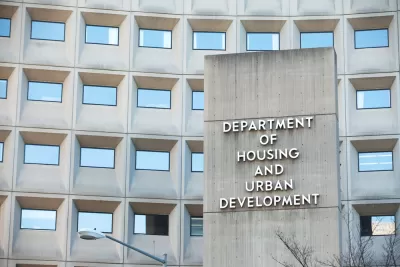Preventing catastrophe when eviction moratoriums lift requires major waivers and changes of policy—but ones advocates say are fully within HUD's power.

The CARES Act that was passed last week contains an additional $12 billion for HUD programs, including $1.25 billion for the Housing Choice Voucher program, $1 billion for project-based rental assistance, and $685 million for public housing agencies.
This sure to be a huge relief to those public housing authorities and owners of HUD-assisted housing that had quickly moved forward with canceling evictions to keep residents in their homes because it was the right thing to do, and were crossing fingers that federal help would come to make up the difference.
However, eviction moratoriums and that federal funding are only part of what public housing residents and HUD-assisted tenants need in order to survive the economic fallout of COVID-19.
What they need right now, say tenant advocates, is for HUD to use its authority to make sure all tenants’ rents go down to match any changes to their incomes, by April 1.
Read more at the source article.
FULL STORY: HUD Urged to Make Tenant Income Adjustments Automatic by April 1

Montreal Mall to Become 6,000 Housing Units
Place Versailles will be transformed into a mixed-use complex over the next 25 years.

Planetizen Federal Action Tracker
A weekly monitor of how Trump’s orders and actions are impacting planners and planning in America.

DARTSpace Platform Streamlines Dallas TOD Application Process
The Dallas transit agency hopes a shorter permitting timeline will boost transit-oriented development around rail stations.

Interactive Map Reveals America's “Shade Deserts”
Launched by UCLA and American Forests to combat heat-related deaths, the tool maps the shade infrastructure for over 360 U.S. cities.

Bicycles and Books — In Sacramento, Libraries Now Offer Both
Adult library card holders can check out e-bikes and e-trikes for up to one week.

Colorado Landfills Emit as Much Pollution as 1M Cars
Landfills are the third-largest source of methane pollution in Colorado, after agriculture and fossil fuel extraction.
Urban Design for Planners 1: Software Tools
This six-course series explores essential urban design concepts using open source software and equips planners with the tools they need to participate fully in the urban design process.
Planning for Universal Design
Learn the tools for implementing Universal Design in planning regulations.
City of Mt Shasta
City of Camden Redevelopment Agency
City of Astoria
Transportation Research & Education Center (TREC) at Portland State University
US High Speed Rail Association
City of Camden Redevelopment Agency
Municipality of Princeton (NJ)





























